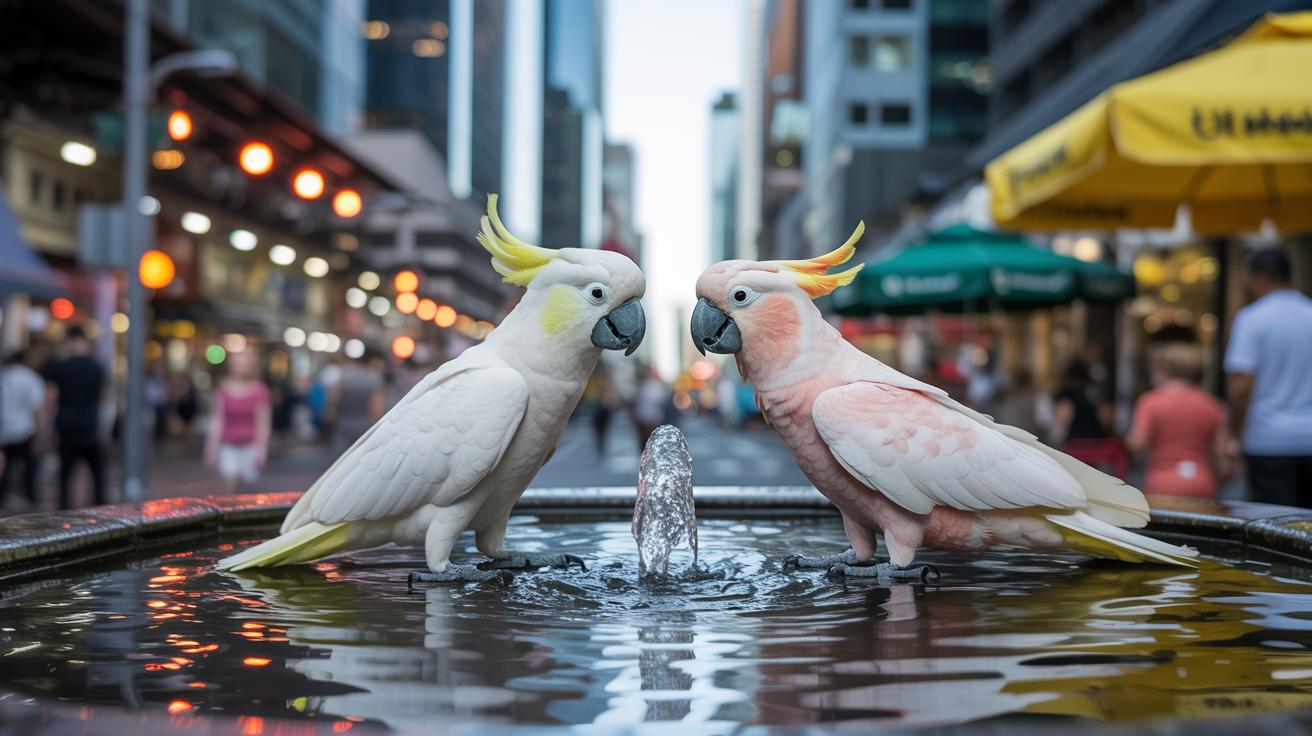What You Need to Know
- 🦜 Ingenious Cockatoos: Sulphur-crested cockatoos in Sydney have developed the ability to open trash cans and access food.
- 🚰 Mastering Water Fountains: These intelligent birds have also learned how to manipulate public water fountains to quench their thirst.
- 🧠 Remarkable Intelligence: The cockatoos’ behaviors highlight their problem-solving skills and adaptability to urban environments.
- 🔍 Research Insights: Scientists studying these birds are gaining valuable insights into animal cognition and social learning in city settings.
- 🌆 Urban Wildlife Adaptation: The cockatoos’ success in urban areas offers a glimpse into how wildlife can thrive amidst human expansion.
In the bustling urban landscape of Sydney, Australia, a remarkable avian phenomenon is unfolding. The sulphur-crested cockatoos, with their striking white plumage and distinctive yellow crests, are captivating scientists and residents alike with their astonishing ability to adapt and thrive in city environments. These intelligent birds have developed a knack for opening trash cans and, more recently, have mastered the art of turning on public water fountains. This behavior not only showcases their impressive intelligence but also raises intriguing questions about animal adaptability and social learning in urban settings.
The Clever Cockatoos of Sydney
The sulphur-crested cockatoos in Sydney are not just another pretty face in the avian world. Known for their loud, grating calls and social nature, these birds are demonstrating remarkable intelligence as they navigate urban environments. Researchers have observed these cockatoos using their beaks and feet to pry open trash can lids, a skill they have honed to access food scraps. This behavior highlights their adaptability and problem-solving abilities, which are crucial for survival in the city.
But their ingenuity doesn’t stop there. The cockatoos have now taken their skills to public water fountains, also known as bubblers. These fountains, operated by twist handles, pose a challenge for most animals. Yet, the cockatoos have figured out how to manipulate the handles to access the water. This ability to learn and adapt to new challenges underscores the birds’ cognitive prowess and their capacity for social learning, as these behaviors are often shared among individuals.
Understanding the Cockatoos’ Drinking Habits
The discovery of cockatoos drinking from public fountains has piqued the interest of scientists. In western Sydney, researchers tagged 24 birds and set up cameras near fountains to observe this behavior. Over two months in the fall of 2019, they recorded numerous instances of cockatoos attempting to drink from the fountains. Despite the complexity of operating the twist handles, the birds succeeded about half the time. This success rate indicates that the cockatoos have been practicing this skill for some time, suggesting a level of social learning and innovation among the flock.
Interestingly, the researchers noted that five out of the ten fountains studied bore “chew marks,” evidence of the cockatoos’ repeated efforts. This behavior raises questions about why the cockatoos prefer fountain water over natural sources. While initial theories suggested that fountains serve as a backup during dry spells, further study is needed to understand the birds’ preferences. Could it be a matter of taste, safety from predators, or simply convenience?
Table: Key Behaviors of Sulphur-Crested Cockatoos
| Behavior | Description |
|---|---|
| Opening Trash Cans | Using beaks and feet to lift lids and access food |
| Drinking from Fountains | Manipulating twist handles to access water |
| Social Learning | Sharing learned behaviors within the flock |
Implications for Urban Wildlife
The innovative behaviors of Sydney’s sulphur-crested cockatoos have broader implications for our understanding of urban wildlife. These birds are not just surviving but thriving in a human-dominated environment by using their intelligence and social skills to access resources. This adaptability highlights the potential for other urban wildlife species to develop similar strategies, potentially leading to new interactions between humans and animals in cities.
Moreover, the study of these cockatoos offers valuable insights into the cognitive abilities of birds, particularly in the context of urbanization. As cities continue to expand, understanding how wildlife can adapt to changing environments becomes increasingly important. The cockatoos’ ability to learn from each other and innovate could serve as a model for studying other species and their responses to urban challenges.
The Future of Cockatoo Research
Looking ahead, researchers are eager to explore what other capabilities sulphur-crested cockatoos might possess. Reports of these birds unzipping school backpacks to steal lunches suggest a level of innovation that extends beyond trash cans and water fountains. The potential for further discoveries is vast, as scientists continue to study these intelligent birds and their interactions with urban environments.
This ongoing research not only contributes to our understanding of cockatoos but also sheds light on the broader dynamics of animal adaptation in cities. As the world becomes increasingly urbanized, studying these interactions will be crucial for developing strategies to support wildlife conservation and coexistence in urban areas.
The story of Sydney’s sulphur-crested cockatoos is a testament to the resilience and adaptability of wildlife in the face of human encroachment. As we continue to explore their capabilities, one question remains: What other surprising behaviors might these clever cockatoos reveal in the future?
Did you like it?4.3/5 (21)







11 comments
nala
Fascinating stuff! How long have scientists been observing these behaviors, and what do they plan to study next?
NathanPhoenix
Why do you think the cockatoos prefer fountain water? Is it cleaner or just more fun to get? 🤔
rubycelestia
This is such a cool phenomenon! It makes me wonder what humans are missing by not watching nature closely enough.
ZoeTwilight
Can their behavior affect the ecosystem in any way, or is it just harmless fun for the cockatoos?
GraysonFlux
The adaptability of these birds is truly remarkable. How does this impact local waste management strategies in Sydney?
RileyVoyager
These cockatoos are like little feathered engineers. Maybe they can help me unlock my phone next time I forget the password!
TristanWanderer
Thanks for the update! I’m curious to know if this behavior is spreading to other cities or just in Sydney?
ellie
I’ve seen them in action in Sydney! It’s both amusing and a little scary how smart they are. Nature always finds a way!
joseph
How do the cockatoos compare to other urban birds in terms of intelligence? Are they the Einsteins of the bird world?
Faith4
This is incredible news! Thank you for sharing this fascinating insight into urban wildlife.
faith2
Wow, those cockatoos are amazing! Do you think they’ll start opening doors next? 😄